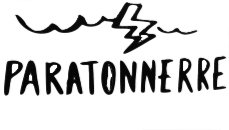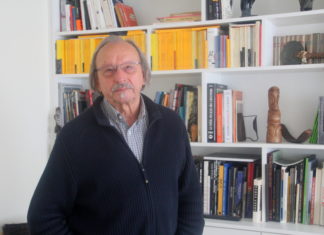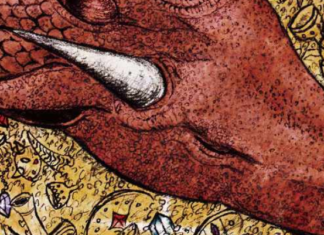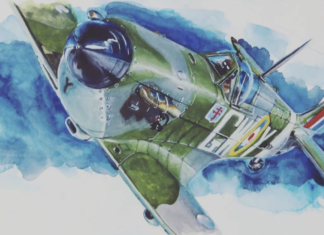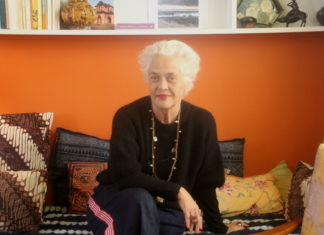English
Pays d’Asie centrale, l’Afghanistan est surtout connu pour être le théâtre d’affrontements avec les Talibans mais reste pourtant un pays avec un passé très riche et une cuisine si particulière. Oui une cuisine qui a su s’enrichir avec les parfums de l’Orient et les saveurs de l’Occident.
Projet « éco Kitchen », le Kabul Kitchen (2, rue Saint Sauveur- Paris 2) propose justement de mieux connaître cette cuisine afghane. Le restaurant est tenu par une parisienne, Fatima, et deux anciens réfugiés afghans.
Entretien avec l’un d’entre eux, Ali pour parler cuisine et Afghanistan.
Comment pourriez-vous décrire la cuisine afghane ?
Elle est très importante dans la culture afghane. Même si c’est de la nourriture simple lorsque nous avons des invités, nous faisons des plats spécifiques et qui demandent beaucoup de temps de préparation. C’est notre façon d’honorer nos invités. Selon moi, la cuisine afghane est vraiment délicieuse et vient d’une longue histoire. Elle mérite d’être plus connue.
En Afghanistan, il y a beaucoup de cultures mais y’a-t-il des plats que l’on retrouve partout ?
Chaque ville, chaque province a ses propres plats. Par exemple, dans le Nord du pays, ils mangent beaucoup de viande de boeuf. Ils découpent de gros morceaux et y ajoutent du sel et font sécher la viande dans des places froides.
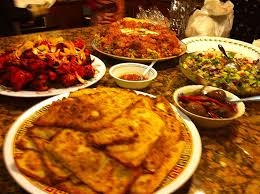
Le riz est partout dans la cuisine afghane mais est-ce toujours servi de la même façon ?
Oui mais en effet ce n’est jamais servi pareil. Le kabuli à Mazar est cuisiné avec tous les ingrédients (carottes, viande, raisins, riz,…) mais dans d’autres régions, ils cuisinent le riz à part.
Il est dit que cuisiner était uniquement réservé aux femmes sous le régime des Talibans. Etait-ce un défi pour vous d’apprendre à cuisiner ?
Sous les Talibans, les hommes pouvaient cuisiner. Il y a beaucoup de restaurants tenus par exemple par des hommes. Pour moi, lorsque vous apprenez quelque chose ce n’est jamais ennuyeux. Lorsqu’on cuisine, vous voulez toujours vous améliorez et c’est surtout un défi avec la cuisine afghane car il y a toujours le souci qu’elle soit savoureuse.
Vous avez été migrant dans toute l’Europe.
J’ai quitté l’Afghanistan en 2008 pour aller en Norvège. J’ai vécu là-bas jusqu’en 2012. Ma demande de prolongation de séjour a été refusée et j’ai dû rentrer en Afghanistan. Mais je m’étais marié en Norvège donc je voulais vraiment revenir. J’ai finalement choisi de venir 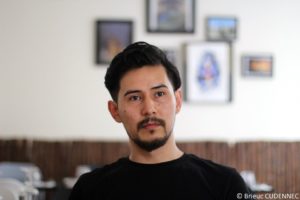 en France. Lorsque je suis arrivé ici, les autorités ont retrouvé mes empreintes digitales faites en Norvège. On a voulu me rapatrier là-bas. Mon épouse était parti vivre en Angleterre et évidement mon but était de la rejoindre. Je suis donc allé à Calais et j’y suis resté pendant 3-4 mois. Chaque nuit, j’étais d’aller en Angleterre mais j’ai toujours échoué. J’ai eu l’idée d’aller en Belgique mais cela n’a pas marché non plus. J’ai dû retourner en Afghanistan mais cette fois, le pilote de l’avion m’a refusé à bord. Je lui avais expliqué mon histoire et je l’ai persuadé de me refuser. Puis je suis retourné en détention. La Norvège a refusé ma demande de retour mais la France a finalement accepté de me garder. J’ai attendu la décision de justice et j’ai rencontré Fatima qui m’a proposé de travailler dans un restaurant afghan à Paris. C’est ainsi que j’ai rejoint l’équipe. Il n’y a pas beaucoup de restaurants afghans à Paris et nous avons une façon particulière de présenter notre pays. La cuisine est toujours une excuse de parler de nos orgines. Comme je l’ai déjà dit, l’Afghanistan a une très longue histoire avec une multitude de cultures. Ce n’est pas seulement une zone de guerre.
en France. Lorsque je suis arrivé ici, les autorités ont retrouvé mes empreintes digitales faites en Norvège. On a voulu me rapatrier là-bas. Mon épouse était parti vivre en Angleterre et évidement mon but était de la rejoindre. Je suis donc allé à Calais et j’y suis resté pendant 3-4 mois. Chaque nuit, j’étais d’aller en Angleterre mais j’ai toujours échoué. J’ai eu l’idée d’aller en Belgique mais cela n’a pas marché non plus. J’ai dû retourner en Afghanistan mais cette fois, le pilote de l’avion m’a refusé à bord. Je lui avais expliqué mon histoire et je l’ai persuadé de me refuser. Puis je suis retourné en détention. La Norvège a refusé ma demande de retour mais la France a finalement accepté de me garder. J’ai attendu la décision de justice et j’ai rencontré Fatima qui m’a proposé de travailler dans un restaurant afghan à Paris. C’est ainsi que j’ai rejoint l’équipe. Il n’y a pas beaucoup de restaurants afghans à Paris et nous avons une façon particulière de présenter notre pays. La cuisine est toujours une excuse de parler de nos orgines. Comme je l’ai déjà dit, l’Afghanistan a une très longue histoire avec une multitude de cultures. Ce n’est pas seulement une zone de guerre.
Le restaurant « The Kabul kitchen » a aussi un aspect social. Vous donnez ce qui n’a pas été vendu aux sans-abris. Est-ce important pour vous d’aider ceux qui n’ont pas la chance de vivre dignement ?
Nous ne pouvons juger ceux qui vivent dans la rue. L’humanité est une priorité. Nous ne savons rien de leur passé, nous ne pouvons les aider à avoir un travail mais au moins, nous pouvons leur offrir de la nourriture. Nous ne voulons pas gaspiller et c’est notre cadeau aux réfugiés et à ceux qui sont dans le besoin.
Quel est le plat que vous préférez cuisiner ?
Le kabuli. C’est très populaire en Afghanistan. Même si ce plat vient de Kaboul, on le retrouve dans beaucoup d’autres villes. C’est juste cuisiner différemment. Certains le cuisine avec l’ensemble dans un seul pot (riz, raisins, carottes). D’autres y ajoutent de l’aïl.
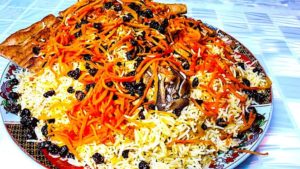
Le Kabul Kitchen : http://kabulkitchenparis.fr/
La page facebook du Kabul Kitchen : https://www.facebook.com/KabulKitchenofficiel/
In Central Asia, Afghanistan is sadly well known as a war zone with the Taliban but it is still a country with a rich history and cuisine so special. Yes, the Afghan cuisine grew up with the perfumes of the Orient and the flavors of the West.
As an ‘eco-kitchen project’, The Kabul Kitchen (2, rue Saint-Sauveur, Paris 2) offers more knowledges about the Afghan cuisine. The restaurant is run by a Parisian woman, Fatima, and two former Afghan refugees.
Interview with one of them, Ali, to talk about cuisine and Afghanistan.
How could you describe the Afghan cuisine ?
The food in the Afghan culture is very important. Though in Afghanistan, there is simplz food, when we have some guests, we make special food which it takes a lot of time. It’s our way of honoring our guests. In my opinion, the Afghan cuisine is really tasty with a very long history and it deserves to be known.
In Afghanistan, there is a lot of different cultures but are there any common dishes ?
Every city and province has their own food. For instance, they eat a lot of beef in the North. They cut big pieces of meat and put some including salt inside and they dry them in cold places.

Rice is everywhere in the Afghan cuisine but is it always served on the same way ?
It is similar but it’s never served on the same way. The Kabuli in Mazar is cooked with all the ingredients (carrots, meat, raisins, rice,…) but in other areas, they cook the rice differently.
It is told that cooking was only reserved for women under the Taliban’s regime. Was it a challenge for you to learn cooking?
Under the taliban the men were able to cook for example there is many restaurants runs by men
When you learn something you like it’s never boring. When you cook, you want to improve yourself and it’s especially challenging with the Afghan food because it must be very tasty.
You were migrant in over all Europe.
I left Afghanistan in 2008 to Norway. I lived there till in 2012. My assignment was refused and I had to come back to Afghanistan. But before I get married in Norway so I really wanted to go back but I finally wasn’t allowed. I finally chose to go to France. When I came here, the authorities found out my finger prints taken in Norway and wanted to send me back there. My wife moved to England and obviously I tried to join her. I came to Calais and was there for 3-4 months. Every night, I tried to go to England and I always failed. I had the idea to go to Belgium but it wasn’t successful either. I had to go back to Afghanistan but this time the pilot of the plane refused me. I had explained my story to him and I persuaded him to refuse me on his plane. Then I came back to detention. Norway didn’t accept my request but France did. I waited for the court decision and I met Fatima who asked me I wanted to work in an Afghan restaurant in Paris. And I finally joined the team. There are not many Afghan restaurants in Paris and our way to introduce our country to the people. Food is always a good excuse to talk about our country. Afghanistan has a very long history with many different cultures. It’s not only a warzone.
taken in Norway and wanted to send me back there. My wife moved to England and obviously I tried to join her. I came to Calais and was there for 3-4 months. Every night, I tried to go to England and I always failed. I had the idea to go to Belgium but it wasn’t successful either. I had to go back to Afghanistan but this time the pilot of the plane refused me. I had explained my story to him and I persuaded him to refuse me on his plane. Then I came back to detention. Norway didn’t accept my request but France did. I waited for the court decision and I met Fatima who asked me I wanted to work in an Afghan restaurant in Paris. And I finally joined the team. There are not many Afghan restaurants in Paris and our way to introduce our country to the people. Food is always a good excuse to talk about our country. Afghanistan has a very long history with many different cultures. It’s not only a warzone.
The restaurant has also a social aspect. You give the leftovers to the homeless. Is it important to help out those people who don’t still have to the chance to properly live?
We can not judge people sleeping in the streets. Humanity is paramount. We know nothing about their past, we can not help them offering a job but at least we could give some food. We don’t want to waste it so it’s our gift to the refugees and any people in need .
What is your favourite meal to cook?
The kabuli is my favourite one. It is really very popular in Afghanistan. Although it’s from Kabul, in many cities, they cook kabuli too but in different ways. Some people put everything (rice, raisins, carrots) together in one pot. Some put garlic too. «

Further informations (only in French) :
Facebook fan page : https://www.facebook.com/KabulKitchenofficiel/
